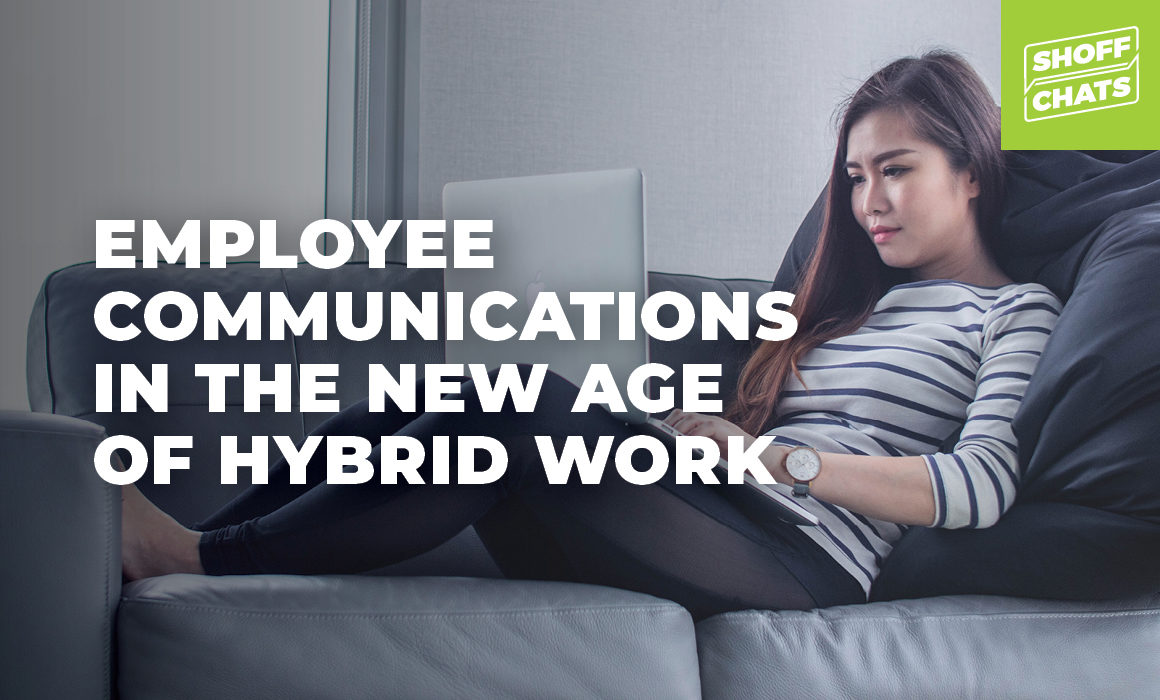Employee Communications in the New Age of Hybrid Work
As the pandemic begins to loosen its grip on the world, many office-based companies are shifting to a hybrid approach of work-from-home/work-from-office. According to workplace research firm DORIS, the majority of office workers want this type of flexibility. Indeed, hybrid is being talked about as a once-in-a-lifetime opportunity to reset work in favor of greater employee-centricity.
We think this is a good thing: the more autonomy workers perceive in their jobs, the better engagement tends to be. But research shows that a hybrid work environment will also be the most challenging to manage. Productivity is likely to remain high, but innovation, creativity, strategy and collaboration may suffer. How can organizations maximize the promising aspects of hybrid while mitigating the risks?
In a recent Shoff Chat with DORIS Research, we asked President Sam Julka, what should be the number one consideration for companies as they plan for and begin to implement the “new normal” of hybrid work? Throughout our discussion, the same insight kept emerging: the move to hybrid isn’t just operational – organizations must proactively prepare for their cultures to evolve
After all, your company’s culture – and the ways in which that culture was lived out – were probably defined in the context of being together, which no longer reflects our reality. Here are four considerations to help leaders and communicators prepare to address their shifting cultures in the hybrid model.
Lean on Employee Data & Feedback
Be certain the voice of the employee is represented in your decision making. It will be important to not take shortcuts in being inclusive and representative in considering how different employees are going to experience the challenges and benefits of a hybrid arrangement.
Consider:
- Simple surveys, focus groups and 1:1 interviews to assess employee perception/sentiment around concerns and priorities related to hybrid. These results will also serve as benchmarks to measure progress over time.
- Researching and developing personas based on different types of employees,
their preferences, and how they do their best work. - Customizing hybrid arrangements for these personas in a manager playbook, where these arrangements and how to implement them are codified.
Revisit Your Values
Just as your culture was defined in the context of being together, it’s likely your core values were too. And while it’s not likely your organization’s values need a complete overhaul, it’s possible new values have emerged over the course of the pandemic – and you may want to formalize them. Consider the role and impact that empathy, vulnerability, transparency, and employee-centricity have had during this challenging time. Your values deserve a look through this new lens.
Redefine and Align Around Cultural Norms
Once you’ve revisited your core values, it’s time to redefine your cultural non-negotiables and practices to clearly articulate how your hybrid arrangement will impact the employee experience. For example, is “togetherness” still part of your culture, at least some of the time? If so, how are you setting and communicating expectations? How are you preparing managers and holding people accountable? How are you continuing to enable innovation, creativity, and collaboration under the new model?
Your organization’s leaders should be aligned around your approach.
Update your Employee Value Proposition
An effective way to define and articulate the hybrid employee experience is to refresh your Employee Value Proposition. Identifying “what employees get” from the hybrid model is incomplete without considering what they have to “give” in return. Updating your EVP will help leaders and managers effectively communicate any tradeoffs and expectations that might come along with the increased flexibility of a hybrid model.
We predict the balancing act of the hybrid model will be challenging for even the strongest organizational cultures, and these are just a few of many considerations that will have an impact on companies’ abilities to thrive in this new way of working.
Ready to develop your return-to-work strategy and communications? We can help. Contact Meg Marra to chat today.
Listen to this episode or past Shoff Chats episodes here.


